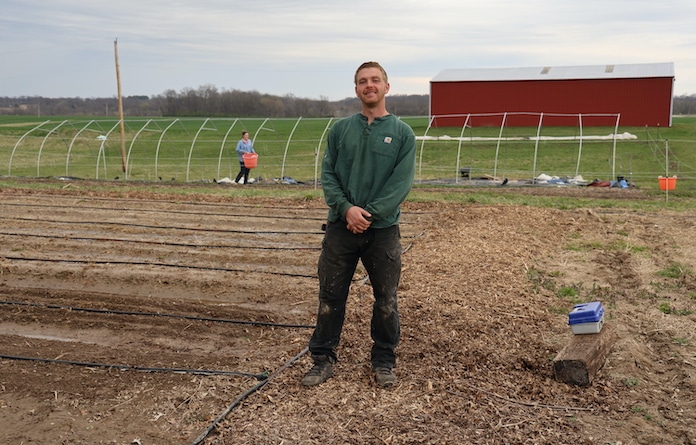Stumpf fighting to farm

Monroe County has plenty of love and appreciation for its farmers, whether they’re showing livestock at the county fair, setting up a booth at a farmers market or celebrating a major generational milestone on a family farm.
But farming isn’t easy.
Poor weather, costly equipment and ever-fluctuating prices are making things difficult for everyone, certainly for folks who are trying to get a farm up and running.
One such young farmer is Ben Stumpf, who’s been forging ahead with Rumblin’ Ernie Farm over the past few years, making a place for himself in rural Columbia even as he’s faced a slate of problems like harsh weather and the recent cuts to several critical grants for his business.
As Stumpf explained, his family has had strong roots in the area for some time, ever since a handful of Stumpfs came up from New Orleans to farm all around the area.
The long line of family farmers was broken when his father opted to move out of the area, having gotten a bit burnt out on farming while growing up.
Ben Stumpf was raised in the South City area of St. Louis, though he did find himself returning to the area not infrequently to help out his grandfather on the farm.
He made a bid for higher education, though – having more of a hands-on interest – he instead wound up pursuing an apprenticeship on a vegetable farm up in Lincoln, Neb.
Stumpf also found a strong interest in carpentry.
“I spent a year out there learning how to farm, and then I came back from that and started doing various carpentry, construction jobs because I knew it overlapped good with farming work,” Stumpf said.
With farming well in his blood, he felt a strong pull toward the profession, though Stumpf also credits his older sister with pushing him in that direction.
As he said, he would occasionally visit her as she was attending the University of Missouri, and her interest in local food managed to rub off on him and give him a deep appreciation for fresh and local produce.
Stumpf was also interested in all the challenges that come with life on the farm.
“I guess that was the biggest thing at that age, spending time out with her and getting to taste fresh, local food and it having a noticeable difference really attracted me,” Stumpf said. “And in farming, there’s just so many different ways to go about it that attracted me. There’s not a one-size-fits-all. Every farm is different. I like the challenge a farm brings of making it all work with your circumstances, limits and capacity.”
Following a brief stint working on a farm up in Bloomington, Stumpf came back to Monroe County to establish his own operation, and he picked an interesting time to do so.
“In 2020 I finally started my own, and that was at the peak of the (COVID-19) pandemic, so a lot of uncertainty with markets,” Stumpf said. “I knew that people needed food for sure, but the farmers’ markets were uncertain at the time.”
In the years since, Rumblin’ Ernie Farm has built some solid foundations in the community, growing around two dozen different crops throughout the year in a fairly small area, also making very good use of a greenhouse to keeping the growing going.
Though Stumpf said the farm is still in-progress as they try to get their infrastructure where they really want it, he also said they’ve seen a fair share of success.
He shied away from the farmers market previously hosted at the Family Video location in Waterloo, saying he didn’t want to step on any toes given the small number of vendors.
The market in Edwardsville has proven to be quite welcoming, however, and Stumpf said he’s looking forward to joining folks at the Columbia market later this week.
He also noted that he’s heard from customers that they appreciate the variety of his offerings, especially the more exotic produce he has available with the heirloom varieties he likes to grow.
Altogether, Stumpf spoke quite positively about his experience working farmers markets.
“I like the fact that it’s one of the few places where the community can come together and socialize with their neighbors,” Stumpf said. “I feel like those are nonexistent nowadays.”
While the farm has had a decently strong start, Stumpf also had plenty to talk about when it comes to some of the issues he’s faced.
Some of the hurdles he’s encountered recently include a number of grants and programs that have received cuts to their federal funding.
The two major programs Stumpf pointed to were the Illinois Resilient Food Systems Infrastructure Program and the Local Food Purchase Assistance Program, both helmed by the U.S. Department of Agriculture.
The first of these programs, RFSI, was meant to support the middle of the food supply chain, improving capacity by offering grants to a range of parties – including farmers and folks who process or distribute food – with the money meant to be put toward projects that facilitate or expand food production and distribution.
This program was suspended back in March as concerns were raised about federal funding continuing.
Also suspended was the LFPA program, though this program is still set to operate until June, ceasing operations for the next fiscal year.
Stumpf spoke at length about this program, which uses federal funds to buy produce from farmers and distribute it to communities who need it.
He emphasized how LFPA did a lot to ease some of the burden he’s felt, providing him with a very straightforward means of selling his produce while connecting him with area food pantries, also taking care of the actual transportation of the produce.
“They were able to absorb large amounts of produce and distribute,” Stumpf said. “They had everything in a system, volunteers at food banks, and everything was just already set where they could pick it up. My workload, hourly, dropped drastically because I wasn’t having to run around and be in 100 different places. That was a huge benefit, the logistics.”
Stumpf further emphasized the good that he saw this program do. Volunteering at the Hope Christian Church food pantry, he noted how nice it was to see folks in the community get what they need.
With contact information for various food banks now in his phone, Stumpf remarked that the program exposed him to a whole new world.
He further emphasized how beneficial the program was for everybody, reiterating how he was able to receive compensation through the state while helping with food insecurity in the area.
Of course, these grants getting cut are only some of the issues Stumpf has had to contend with, weather being the other big issue.
Speaking amid the heavy storms that hit the area in late March and April, Stumpf pointed to the damage done to his greenhouse as well as the lack of crop insurance availability and affordability for farms of his size.
“We’ve had freezes and unfreezes. I’ve had about five weeks of not being paid, so it’s cut into my income,” Stumpf said. “I’ve considered getting a second job… We’re back on track as far as I know until June, and then the second year – it’s supposed to be a two-year program – the second year is canceled for the fiscal year after June.”
Stumpf further spoke about some of the broader issues he’s encountered trying to find his place as a farmer in the area, taking on debt to get the infrastructure he has and handling labor costs as he strives to provide his employees with a livable wage.
There’s also the matter of organic certification which he was previously able to be reimbursed for. Though his growing practices haven’t changed, he’s since found himself unable to pay for that certification.
With a number of other news organizations such as KMOV reaching out to Stumpf and other farmers experiencing similar struggles, he’s not been shy about discussing how difficult things can be for him and his peers.
“Now all these grants are gone and federal funding is gone, hopefully Illinois taxpayers would be interested in helping farmers with a lot of the burden that comes with farming, the risks it entails, the weather,” Stumpf said.
Urging for more support from the state – including making the LFPA program permanent in Illinois – he stressed that he’s looking for grants, not “freebies.”
He also noted that he’d like these sorts of programs to be permanently available for any farm that’s interested, not just those that are starting out.
“It’s kind of like a rite of passage for farmers in America to go through all these headaches, and I don’t think it should be that way,” Stumpf said. “I think farmers need support from the community because everyone’s gotta eat.”
Speaking more recently and looking to the future, Stumpf noted that the aforementioned grants are still suspended, though he is generally hopeful.
He reiterated his plans to participate in the Columbia farmers market, as well as his intention to continue participating in LFPA for the next few months until that money runs out in the summer.
Stumpf also expressed his thanks to the community as just one of many in a county that loves and appreciates its farmers.
“We’ve had a lot of outreach from family, friends and people in the community that’s been really great, and we really appreciate it,” Stumpf said.






